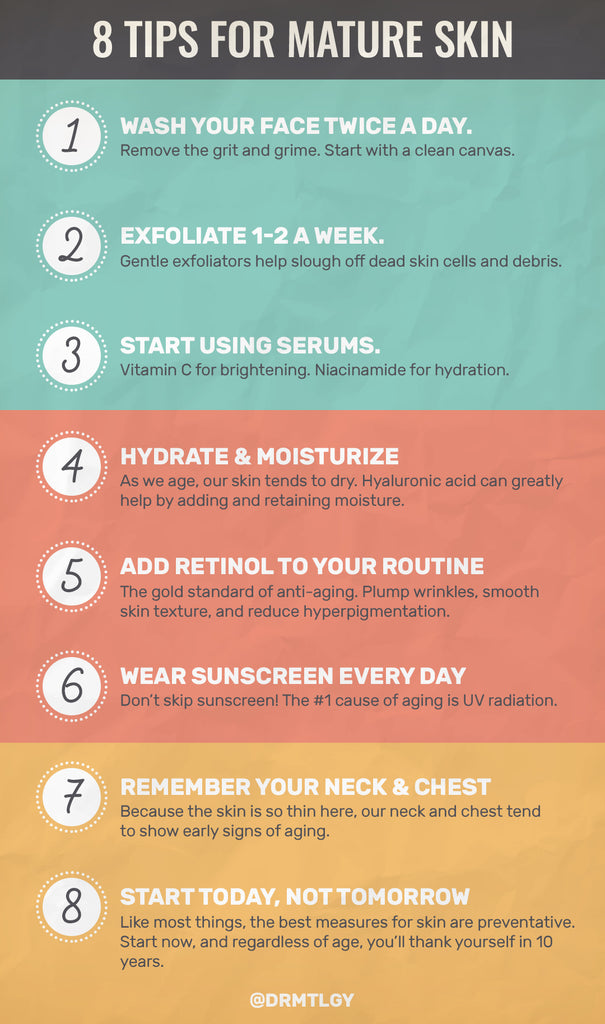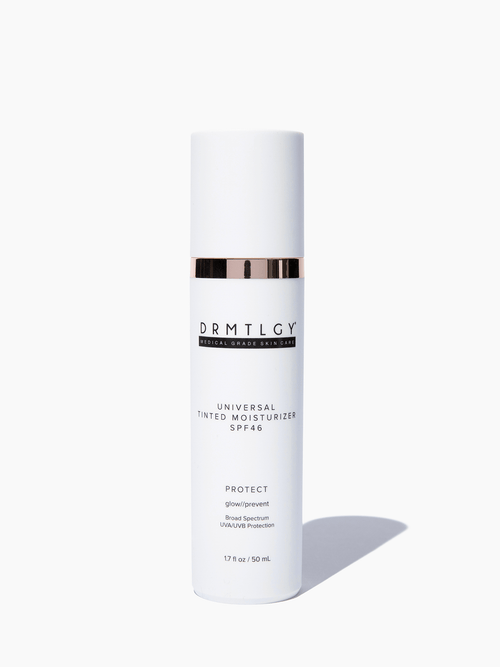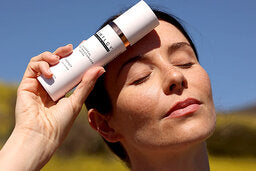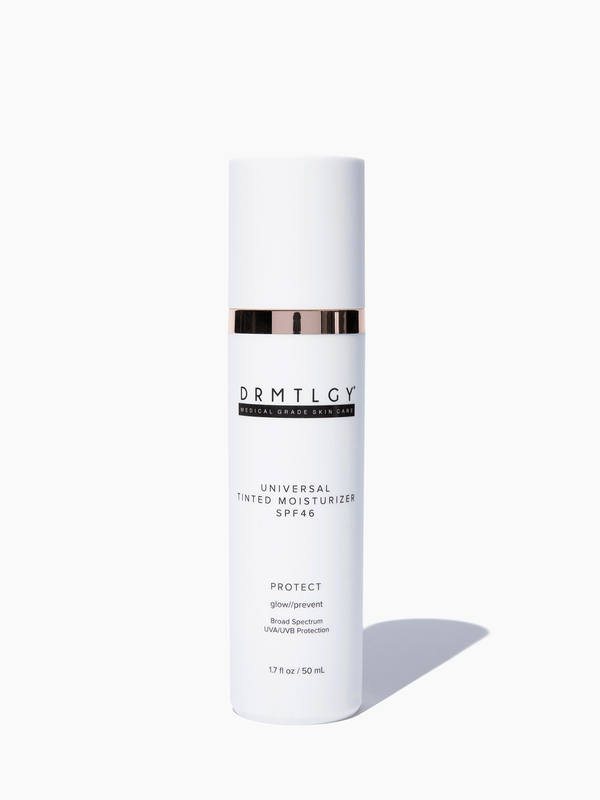Thanks to advances in science and skincare technology, women are living longer, healthier, and more fulfilling lives. So it’s only natural that we want to have skin that reflects that. Our skin has protected us all of these years; it’s time to nurture it so that it looks and performs its best in the years ahead. So, whether you’re 60 and want to maintain healthy skin, or if you simply want to get started with anti-aging products, this is for you. Here’s how to put together an anti-aging skincare routine for mature skin.
What Happens to Your Skin as It Matures?
Fact: Your skin changes as you grow older.
But why is that?
Through a process called intrinsic aging, the collagen and elastin in your skin begin to break down over time. It also becomes increasingly difficult for your skin to produce more of these much-needed proteins. This leads to mature skin losing its elasticity and firmness. Additionally, you may begin to see additional signs of age, including wrinkles, fine lines, and age spots.
This “internal” cause of skin aging is different from extrinsic aging, which is caused by environmental factors such as UV damage and the lifestyle you keep.
Fortunately, with a dedicated skincare routine, you can slow down the effects of intrinsic -- and even extrinsic -- aging. Keep reading for eight tips to help you build the perfect anti-aging regimen.
8 Tips to Keep Your Skin Looking Healthy at Any Age

Wash your face with a cream cleanser twice a day.
A great anti-aging skincare routine starts with a clean canvas, and that’s where a reliable cleanser comes in.
As your skin matures, you may find that it looks and feels drier than it used to. So, you’ll want to pick up a cream cleanser instead of a foaming one. A creamy formula doesn’t strip your skin of moisture, and they’re usually gentler too, making them great for those with sensitive skin. If dry skin is a concern of yours, also make sure to wash your face with cold or lukewarm water instead of hot.
Avoid vigorously scrubbing your face as well; mature skin will begin to show signs of sagging and wrinkling, and the downward movements you make when you scrub your face or apply products add to that.
Exfoliate once a week.
Consider adding a gentle exfoliator, like glycolic acid or lactic acid, to your skincare routine once or twice a week. Although dead skin cells slough off naturally, sometimes they can hang on for a bit longer, leaving you with dull and dry-looking skin.
Using an AHA- or enzyme-based exfoliation product will sweep away these dead skin cells, leaving you with skin that’s bright and lively. Regular exfoliation also helps the rest of the products in your regimen work more effectively because they’re better absorbed into the skin, so it’s a win-win for you.
However, make sure to avoid physical scrubs. Natural ones containing ground-up walnut shells and the like damage your skin by creating micro-tears on the surface, while those with artificially-made microbeads are harmful to the environment.
(Here are some tips on how to incorporate alpha-hydroxy acids into your skincare routine.)
Apply a serum for maximum skincare benefits.
Use a serum to tackle any additional skincare concerns you may have. Unlike many cleansers, moisturizers, or creams, serum formulations are packed with potent ingredients that get to the root of any skin issue.
Look for products containing vitamin C to tackle hyperpigmentation and increase collagen production. Meanwhile, niacinamide works to reinforce your skin’s barrier, reducing water loss and boosting overall hydration.
Hydrate and moisturize.
Dry, flaky skin is a common problem many women experience as they grow older. This is because it becomes more difficult for skin to retain water over time. But, with an arsenal of hydrating and moisturizing products, you can help ensure that it doesn’t become a problem for you.
Incorporate hyaluronic acid into your routine for some much-needed moisture. Its molecules are able to hold up to 1000 times its weight in water, and promotes cell renewal to boot. When skin cells receive proper hydration, they plump up, which reduces the appearance of wrinkles and fine lines too.
Follow it up with your favorite moisturizer to seal in all of that water and give your skin a glowing look. To ensure that moisture stays locked in, you can also layer a few drops of a facial oil over your moisturizer.
As you grow older, your skin has a harder time producing oil naturally (which is one of the reasons why dryness is an issue for mature skin). Adding a facial oil, like grapeseed or sweet almond oil, repairs your skin’s natural barrier and keeps it looking its best.
(Hydrating? Moisturizing? To brush up on the difference between these two terms, take a look at this blog post.)
Add retinol to your anti-aging skincare routine.
Retinol is the gold standard when it comes to anti-aging. This vitamin A derivative is celebrated by dermatologists and estheticians alike because it counteracts many of the effects of skin aging.
Apply a retinol product once or twice a week to increase skin cell turnover, boost collagen production, reduce hyperpigmentation and wrinkles, and even reduce sun damage.
Wear sunscreen every day.
Of course, including ingredients like retinol and vitamin C in your regimen doesn’t mean you can skip out on sunscreen. The reason? Reducing the effects of UV radiation is one of the most effective ways to slow down skin aging.
Wear a broad-spectrum sunscreen with UVA and UVB protection as well as at least SPF 30. Make sure to reapply every two hours if you’ll be out and about -- regardless of the weather.
Don’t just limit it to your face either. Make sure to apply sunscreen to your neck, chest, ears, and the backs of your hands too.
(To learn more about the importance of sunscreen, as well as some tips on how to use it effectively, take a look at this blog post.)
Don’t forget your neck and chest.
Because the skin on your neck and chest are relatively thin, they’re prone to showing signs of aging as well. So whenever you do your skincare and sun care routine, make sure to apply each product to your décollete as well.
Start today, not tomorrow.
The best skincare is preventative, so you’ll want to start your routine as soon as possible to reap the most benefits. The hormonal changes that affect your skin can start as early as 30, so every day that you follow your skin regimen makes a difference.
Additionally, you’ll also want to make sure that your lifestyle is aligned with your skincare goals. This means:
- No smoking and excessive drinking
- Getting a full eight hours of sleep every night
- Exercising regularly
- Drinking lots of water
- Maintaining a healthy, nutrient-rich diet
After all, the little things play a much bigger part in your skin health than you think.
At the end of the day, looking good and feeling good comes down to your confidence. Be proud of your features; every laugh and smile line is representative of the full life you’ve lived and the memories you’ve made.
Think of your anti-aging skincare routine as a way to address any skin concerns you may have, while maintaining everything you love about your body’s largest organ.
Commit to making a small addition to your current regimen -- whether it’s washing your face twice a day, drinking more water, or something else -- and slowly but surely building on these habits until you have the anti-aging routine you want.
Not sure where to start? Check out our anti-aging collection for professional-grade skincare without the high markup costs.
References
Pakistan Journal of Pharmaceutical Sciences, March 2014, Volume 27, Issue 2, pages 233-237
Clinical Interventions in Aging, December 2006, Volume 1, Issue 4, pages 327-348
Annals of Internal Medicine, June 2013, Volume 158, Issue 11, pages 781-790













